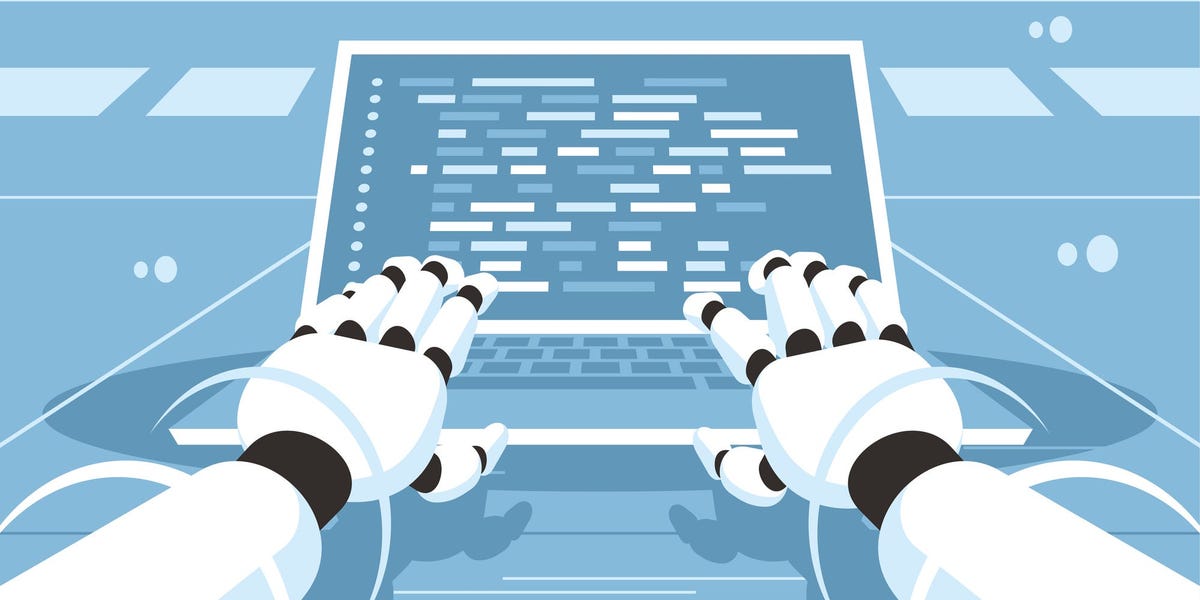The difficult part of software development has always been the continuing support. Did the chatbot setup a versioning system, a build system, a backup system, a ticketing system, unit tests, and help docs for users. Did it get a conflicting request from two different customers and intelligently resolve them? Was it given a vague problem description that it then had to get on a call with the customer to figure out and hunt down what the customer actually wanted before devising/implementing a solution?
This is the expensive part of software development. Hiring an outsourced, low-tier programmer for almost nothing has always been possible, the low-tier programmer being slightly cheaper doesn’t change the game in any meaningful way.
Removed by mod
If you just let it do a full rewrite again and again, what protects against breaking changes in the API? Software doesn’t exist in a vacuum, there might be other businesses or people using a certain API and relying on it. A breaking change could be as simple as the same endpoint now being named slightly differently.
So if you now start to mark every API method as “please no breaking changes for this” at what point do you need a full software developer again to take care of the AI?
I’ve also never seen AI modify an existing code base, it’s always new code getting spit out (80% correct or so, it likes to hallucinate functions that don’t even exist). Sure, for run of the mill templates you can use it, but even a developer who told me on here they rely heavily on ChatGPT said they need to verify all the code it spits out, because sometimes it’s garbage.
In the end it’s a damn language model that uses probability on what the next word should be. It’s fantastic for what it does, but it has no consistent internal logic and the way it works it never will.
Removed by mod
Mate, I’ve used ChatGPT before, it straight up hallucinates functions if you want anything more complex than a basic template or a simple program. And as things are in programming, if even one tiny detail is wrong, things straight up don’t work. Also have fun putting ChatGPT answers into a real program you might have to compile, are you going to copy code into hundreds of files?
My example was public APIs, you might have an endpoint
/v2/devicethat was generated the first time around. Now external customers/businesses built their software to access this endpoint. Next run around the AI generates/v2/applianceinstead, everything breaks (while the software itself and unit tests still seem to work for the AI, it just changed a name).If you don’t want that change you now have to tell the AI what to name things (or what to keep consistent), who is going to do that? The CEO? The intern? Who writes the perfect specification?
Removed by mod
Management and sound technical specifications, that sounds to me like you’ve never actually worked in a real software company.
You just said what the main problem is: ChatGPT is not perfect. Code that isn’t perfect (compiles + has consistent logic) is worthless. If you need a developer to look over it you’ve already lost and it would be faster to have that developer write the code themselves.
Have you ever gotten a pull request with 10k lines of code? The AI could spit out so much code in an instant, no developer would be able to debug this mess or do a code review. They’ll just click “Approve” and throw it on the giant garbage heap whatever the AI decided to spit out.
If there’s a bug down the line (if you even get the whole thing to run), good luck finding it if no one in your developer team even wrote the code in the first place.
Removed by mod
Which is why plenty of companies merely pay lip service to it, or don’t do it at all and outsource it to ‘communities’
Absolutely true, but many direction into implementing those solution with AIs.
“I gave an LLM a wildly oversimplified version of a complex human task and it did pretty well”
For how long will we be forced to endure different versions of the same article?
The study said 86.66% of the generated software systems were “executed flawlessly.”
Like I said yesterday, in a post celebrating how ChatGPT can do medical questions with less than 80% accuracy, that is trash. A company with absolute shit code still has virtually all of it “execute flawlessly.” Whether or not code executes it not the bar by which we judge it.
Even if it were to hit 100%, which it does not, there’s so much more to making things than this obviously oversimplified simulation of a tech company. Real engineering involves getting people in a room, managing stakeholders, navigating conflicting desires from different stakeholders, getting to know the human beings who need a problem solved, and so on.
LLMs are not capable of this kind of meaningful collaboration, despite all this hype.
AI regularly hallucinates API endpoints that don’t exist, functions that aren’t part of that language, libraries that don’t exist. There’s no fucking way it did any of this bullshit. Like, yeah - it can probably do a mean autocomplete, but this is being pushed so hard because they want to drive wages down even harder. They want know-nothing middle-managers to point to this article and say “I can replace you with AI, get to work!”…that’s the only purpose of this crap.
I think there is less of a conspiracy, and it’s just pushing investment. These AI articles sound exactly like when the internet was new and most people only had a cursory experience with it and people were pumping any company if they just said the word internet.
Now that “Blockchain” has been beaten to death, they need a new hype word to drive mindless investment.
But they could replace CEOs from what I can tell.
A monkey could replace CEOs.
Please, PLEASE do not use Elon Musk, Bezos and other such people as the training model
So what you’re saying is that 86.66% of the time, it works every time.
80% accuracy, that is trash
More than 80% of most codebases is boilerplate stuff: including the right files for dependencies, declaring functions with the right number of parameters using the right syntax, handling basic easily anticipated errors, etc. Sometimes there’s even more boilerplate, like when you’re iterating over a list, or waiting for input and handling it.
The rest of the stuff is why programming is a highly paid job. Even a junior developer is going to be much better than an LLM at this stuff because at least they understand it’s hard, and at least often know when they should ask for help because they’re in over their heads. An LLM will “confidently” just spew out plausible bullshit and declare the job done.
Because an LLM won’t ask for help, won’t ask for clarifications, and can’t understand that it might have made a mistake, you’re going to need your highly paid programmers to go in and figure out what the LLM did and why it’s wrong.
Even perfecting self-driving is going to be easier than a truly complex software engineering project. At least with self-driving, the constraints are going to be limited because you’re dealing with the real world. The job is also always the same – navigate from A to B. In the software world you’re only limited by the limits of math, and math isn’t very limiting.
I have no doubt that LLMs and generative AI will change the job of being a software engineer / programmer. But, fundamentally programming comes down to actually understanding the problem, and while LLMs can pretend they understand things, they’re really just like well-trained parrots who know what sounds to make in specific situations, but with no actual understanding behind it.
But did you hear that it uses more water than regular data centers?
LLMs are not capable of this kind of meaningful collaboration
Which is why they’re a tool for professionals to amplify their workload, not a replacement for them.
But C-suites will read articles like this and fire their development teams “because AI can do it.” I have my popcorn ready for the day it begins.
deleted by creator
I’ve tried to have ChatGPT help me out with some Powershell, and it consistently wanted me to use cmdlets which do not exist for on premise Exchange. I told it as much, it apologized, and wanted me to use cmdlets that don’t exist at all.
Large Language Models are not Artificial Intelligence.
deleted by creator
Its glorified autocorrect trying to figure out how words string together coherently.
I had a weird XAML error I didn’t quite get, and the LLM gave me BS solutions before giving me back my original code.
deleted by creator
There are by definition artificial intelligence.
Ive had google bard supply me code to use with a google api url that doesnt exist.
This also completely glosses over the fact that AI capable of writing this had huge R&D costs to get to that point and also have ongoing costs associated with running them. This whole article is a fucking joke, probably written by AI
“We asked a Chat Bot to solve a problem that already has a solution and it did ok.”
to solve a problem that already has a solution
And whose solution was part of its training set…
half the time hallucinating something crazy in the in the mix.
Another funny: Yeah, it’s perfect we just need to solve this small problem of it hallucinating.
Ahemm… solving hallucinating is the “no it actually has to understand what it is doing” part aka the actual intelligence. The actually big and hard problem. The actual understanding of what it is asked to do and what solutions to that ask are sane, rational and workable. Understanding the problem and understanding the answer, excluding wrong answers. Actual analysis, understanding and intelligence.
Not only that, but the same variables that turn on “hallucination” are the ones that make it interesting.
By the very design of generative LLMs, the same knob that makes them unpredictable makes them invent “facts”. If they’re 100% predictable they’re useless because they just regurgitate word for word something that was in the training data. But, as soon as they’re not 100% predictable they generate word sequences in a way that humans interpret as lying or hallucinating.
So, you can’t have a generative LLM that is both “creative” in that it comes up with a novel set of words, without also having “hallucinations”.
the same knob that makes them unpredictable makes them invent “facts”.
This isn’t what makes them invent facts, or at least not the only (or main?) reason. Fake references, for example, arise because it encounters references in text, so it knows what they look like and where they should be used. It just doesn’t know what one is or that it’s supposed to match up to something real which says what the text implies that it says.
so it knows what they look like and where they should be used
Right, and if it’s set to a “strict” setting where it only ever uses the 100% perfect next word, if the words leading up to a reference are a match for a reference it has seen before it will spit out that specific reference from its training data. But, when it’s set to be “creative”, and predict words that are a good but not perfect match, it will spit out references that are plausible but don’t exist.
So, if you want it to only use real references, you have to set it up to not be at all creative and always use the perfect next word. But, that setting isn’t very interesting because it just word-for-word spits out whatever was in its training data. If you want it to be creative, it will “daydream” references that don’t exist. The same knob controls both behaviours.
That’s not how it works at all. That’s not even how references work.
deleted by creator
Plot twist - the AI just cut and paste from stack overflow like real devs.
deleted by creator
It should generate its own acceptance tests and keep asking itself to fix it until they all pass
What if it just kept going and created a brand new language and IDE?
Still valid Python code /s
deleted by creator
This is who will get replaced first, and they don’t want to see it. They’re the most important, valuable part of the company in their own mind, yet that was the one thing the AI got right, the management part. It still needed the creative mind of a human programmer to do the code properly, or think outside the box.
They did do management-- They modeled the whole company as individual “staff” communicating with each other: CEO-bot communicates a product direction to the CTO-bot who communicates technical requirements to the developer-bot who asks for a “beautiful user interface” (lol) from the “art designer” (lol).
It’s all super rudimentary and goofy, but management was definitely part of the experiment.
deleted by creator
It was testing that the code worked, of course :) That was the only place that had human intervention, other than a) providing the initial prompt, and b) providing icons and stuff for the GUI, instead of using generated ones. That was the “get out of jail free” card:
In cases where an interpreter struggles with identifying fine-grained logical issues, the involvement of a human client in software testing becomes optional. CHATDEV enables the human client to provide feedback and suggestions in natural language, similar to a reviewer or tester, using black-box testing or other strategies.
It cost less than a dollar to run all those chatbots?
Doubt
Please ignore the hundreds of thousands of dollars and the corresponding electricity that was required to run the servers and infrastructure required to train and use this models, please. Or the master cracks the whip again, please, just say you’ll invest in our startup, please!
A test that doesn’t include a real commercial trial or A/B test with real human customers means nothing. Put their game in the App Store and tell us how it performs. We don’t care that it shat out code that compiled successfully. Did it produce something real and usable or just gibberish that passed 86% of its own internal unit tests, which were also gibberish?
But did it work?
As someone that uses ChatGPT daily for boilerplate code because it’s super helpful…
I call complete bullshite
The program here will be “hello world” or something like that.
Absolutely I can create a code for your app.
void myApp(void) { // add the code for your app here return true; }You may need to change the code above to fit your needs. Make sure you replace the comment with the proper code for your app to work.
Couldn’t even write a void method right, return true!
LMAO. At list it didn’t
sudo void…(:
“hello world” as a service?
It’s great for things like “How do I write this kind of loop in this language” but when I asked it for something more complex like a class or a big-ish function it hallucinates. But it makes for a very fast way to get up to speed in a new language
So just a little more time-consuming than just reading the online documentation.
It’s a lot less in my opinion, because you can just ask it a question rather than having to read and interpret things. Every programming tutorial in every language is going to waste my time explaining how loops and conditionals work, when all I want is how this language does them.
Seriously?
If I google for example:
how to do loops in c#
The first result is https://www.w3schools.com/cs/cs_for_loop.php
In the time it took me to get to that ChatGPT would still be writing its reply.
Right, but you can’t give it the variable names you’re using and have it fill them in, and if you want to do something inside that loop with
I can ask ChatGPT “Write me a loop in C# that will add the variable value_increase to the variable current_value and exit when current_value is equal to or greater than the variable limit_value, with all the variables being floats”
You won’t find that answer immediately on the Internet, and you’re more likely to make errors synthesizing the new syntax.
But you do you, I’ll keep using ChatGPT and looking like a miracle worker.
Right, but you can’t give it the variable names you’re using and have it fill them in, and if you want to do something inside that loop with
Why are you actively trying to avoid learning how to write the loop? Are you planning to have ChatGPT fill in your loop templates for the rest of your life?
But you do you, I’ll keep using ChatGPT and looking like a miracle worker.
It’s going to be slower overall than just using the reference and learning how to do it. I really, really am skeptical that a developer at the level where they need that feature is going to seem like a miracle worker to anyone other than people who are just impressed when you can do anything with a computer.
If writing simple loops with ChatGPT makes you a miracle worker then you might have other problems than AI.
And even simple things break down when you ask it about using library functions (it likes to hallucinate heavily there).
Yea I ask it to show me examples of how to solve specific tasks. Not a whole app.
OTOH, if you take that hello world program and ask it to compose a themed cocktail menu around it, it’ll cheerfully do that for you.
I can totally see the use case for boilerplate, but I’m also very very rarely writing new classes from scratch or whatever.
As always, proof of concept or gtfo
And how long did it take to compose the “assignments?” Humans can work with less precise instructions than machines, usually, and improvise or solve problems along the way or at least sense when a problem should be flagged for escalation and review.
deleted by creator
The new role of a senior dev will be contract work slicing these Gordian knots.
The amount of money wasted building and destroying these knots is immeasurable. Getting things right the first time takes experienced individuals who know the product well and can anticipate future pain points. Nothing is as expensive as cheap code.
deleted by creator
At the designing stage, the CEO asked the CTO to “propose a concrete programming language” that would “satisfy the new user’s demand,” to which the CTO responded with Python. In turn, the CEO said, “Great!” and explained that the programming language’s “simplicity and readability make it a popular choice for beginners and experienced developers alike.”
I find it extremely funny that project managers are the ones chatbots have learned to immitate perfectly, they already were doing the robot’s work: saying impressive sounding things that are actually borderline gibberish
What does it even mean for a programming language to “satisfy the new user’s demand?” Like when has the user ever cared whether your app is built in Python or Ruby or Common Lisp?
It’s like “what notebook do I need to buy to pass my exams,” or “what kind of car do I need to make sure I get to work on time?”
Yet I’m 100% certain that real human executives have had equivalent conversations.
And ironically Python (with Pygame which they also used) is a terrible choice for this kind of game - they ended up making a desktop game that the user would have to download. Not playable on the web, not usable for a mobile app.
More interestingly, if decisions like these are going to be made even more based on memes and random blogposts, that creates some worrying incentives for even more spambots. Influence the training data, and you’re influencing the decision making. It kind of works like that for people too, but with AI, it’s supercharged to the next level.
Researchers, for example, tasked ChatDev to “design a basic Gomoku game,” an abstract strategy board game also known as “Five in a Row.”
What tech company is making Connect Four as their business model?
This is also the kind of task you would expect it to be great at - tutorial-friendly project for which there are tons of examples and articles written online, that guide the reader from start to finish.
The kind of thing you would get a YouTube tutorial for in 2016 with title like “make [thing] in 10 minutes!”. (see https://www.google.com/search?q=flappy+bird+in+10+minutes)
Other things like that include TODO lists (which is even used as a task for framework comparisons), tile-based platformer games, wordle clones, flappy bird clones, chess (including online play and basic bots), URL shorteners, Twitter clones, blogging CMSs, recipe books and other basic CRUD apps.
I wasn’t able to find a list of tasks in the linked paper, but based on the gomoku one, I suspect a lot of it will be things like these.
This is the best summary I could come up with:
AI chatbots like OpenAI’s ChatGPT can operate a software company in a quick, cost-effective manner with minimal human intervention, a new study has found.
Based on the waterfall model — a sequential approach to creating software — the company was broken down into four different stages, in chronological order: designing, coding, testing, and documenting.
After assigning ChatDev 70 different tasks, the study found that the AI-powered company was able to complete the full software development process “in under seven minutes at a cost of less than one dollar,” on average — all while identifying and troubleshooting “potential vulnerabilities” through its “memory” and “self-reflection” capabilities.
“Our experimental results demonstrate the efficiency and cost-effectiveness of the automated software development process driven by CHATDEV,” the researchers wrote in the paper.
The study’s findings highlight one of the many ways powerful generative AI technologies like ChatGPT can perform specific job functions.
Nevertheless, the study isn’t perfect: Researchers identified limitations, such as errors and biases in the language models, that could cause issues in the creation of software.
The original article contains 639 words, the summary contains 172 words. Saved 73%. I’m a bot and I’m open source!
This research seems to be more focused on whether the bots would interoperate in different roles to coordinate on a task than about creating the actual software. The idea is to reduce “halucinations” by providing each bot a more specific task.
The paper goes into more about this:
Similar to hallucinations encountered when using LLMs for natural language querying, directly generating entire software systems using LLMs can result in severe code hallucinations, such as incomplete implementation, missing dependencies, and undiscovered bugs. These hallucinations may stem from the lack of specificity in the task and the absence of cross-examination in decision- making. To address these limitations, as Figure 1 shows, we establish a virtual chat -powered software tech nology company – CHATDEV, which comprises of recruited agents from diverse social identities, such as chief officers, professional programmers, test engineers, and art designers. When presented with a task, the diverse agents at CHATDEV collaborate to develop a required software, including an executable system, environmental guidelines, and user manuals. This paradigm revolves around leveraging large language models as the core thinking component, enabling the agents to simulate the entire software development process, circumventing the need for additional model training and mitigating undesirable code hallucinations to some extent.
I assume the endgame of this is the boardroom suggestion
guybot asking “is this based on real facts? / does this actually function?”
Future software is going to be written by AI, no matter how much you would like to avoid that.
My speculation is that we will see AI operating systems at some point, due to the extreme effectiveness of future AI to hack and otherwise subvert frameworks, services, libraries and even protocols.
So mutating protocols will become a thing, whereby AI will change and negotiate protocols on the fly, as a war rages between defensive AI and offensive AI. There will be shared codebase, but a clear distinction of the objective at hand.
That’s why we need more open source AI solutions and less proprietary solutions, because whoever controls the AI will be controlling the digital world - be it you or some fat cat sitting on a Smaug hill of money.
EDIT: gawdDAMN there’s a lot of naysayers. I’m not talking stable diffusion here, guys. I’m talking about automated attacks and self developing software, when computing and computer networking reaches a point of AI supremacy. This isn’t new speculation. It’s coming fo dat ass, in maybe a generation or two… or more…
That all sounds pointless. Why would we want to use something built on top of a system that’s constantly changing for no good reason?
Unless the accuracy can be guaranteed at 100% this theoretical will never make sense because you will ultimately end up with a system that could fail at any time for any number of reasons. Predictive models cannot be used in place of consistent, human verified and tested code.
For operating systems I can maybe see llms being used to script custom actions requested by users(with appropriate guard rails), but not much beyond that.
It’s possible that we will have large software entirely written by machines in the future, but what it will be written with will not in any way resemble any architecture that currently exists.
deleted by creator
deleted by creator
Future software is going to be written by AI
Of course, if you look far enough into the future. Look far enough and the whole concept of “software” itself could become obsolete.
The main disagreements are about how close that future is (years, decades, etc), and whether just expanding upon current approaches to AI will get us there, or we will need a completely different approach.
I don’t think so. Having a good architecture is far more important and makes projects actually maintainable. AI can speed up work, but humans need to tweak and review its work to make sure it fits with the exact requirements.


















